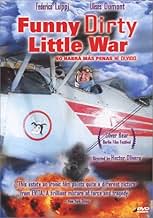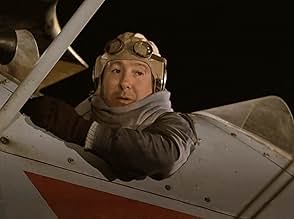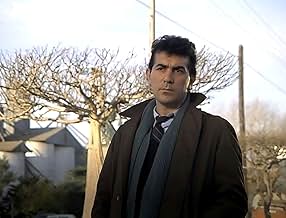Ajouter une intrigue dans votre langueA small revolution breaks out in a small Argentine town, as one group of Peronists calls they newly elected peronist a communist. The newly elected official enlists the aid of allies ranging... Tout lireA small revolution breaks out in a small Argentine town, as one group of Peronists calls they newly elected peronist a communist. The newly elected official enlists the aid of allies ranging from the town drunk to young peronists to help hold his post. What follows is a slapstick... Tout lireA small revolution breaks out in a small Argentine town, as one group of Peronists calls they newly elected peronist a communist. The newly elected official enlists the aid of allies ranging from the town drunk to young peronists to help hold his post. What follows is a slapstick war with a serious message.
- Réalisation
- Scénario
- Casting principal
- Récompenses
- 4 victoires et 2 nominations au total
- Moyanito
- (as Tacholas)
Avis à la une
The script is precise and compact; it doesn't waste scenes or characters and tells all it needs to tell in less than eighty minutes. The story takes place in Colonia Vela, a small town in the province Buenos Aires. The year is 1974, at this period of time Peronismo was the dominant political party and dissidents were persecuted. A left-leaning municipal delegate is falsely accused of being a communist and decides to take up arms and control the municipality, helped by a small group of improvised allies, to demand for his innocence. What ensues is a useless and destructive conflict between the Peronist right and left wing that exemplifies the absurd nature of the internal quarrels that wreaked havoc and paved the way for the extreme right dictatorship that would take over the power in Argentina in 1976.
This film doesn't just drive a message, but also showcase Olivera's direction, dynamic and spectacular, but without going over the edge and becoming ridiculous. There are lots of shootouts, explosions and special effects in this production that is both pioneering and superior to the others that Héctor Olivera directed in association with the Northamerican producer Roger Corman in later years (The White Death, from 1985, is a good example).
The script has a good dose of humor that is used to highlight the absurdity of the situation. This humorous tone is backed by the cast, overflowing with talent. All these aspects help to create familiarity and complicity with the spectator, this comfortable atmosphere is violently shattered in the second half of the film, moving the spectator and reinforcing the impact of the message.
In conclusion, Funny Dirty Little War is a great movie that presents a heavy loaded message in a very entertaining package. I highly recommend it for anyone who appreciates good cinema, although I must say that some knowledge of Argentinian history is necessary to understand this movie completely.
This is the translation of a review first published in FilmAffinity, on the 23 of September of 2020. Written by Germán Dawidowski, translated with the help of Paula Marrodan.
The Peronist left, especially the Montoneros, carried out their assignment to perfection creating, by means of guerrilla actions, a climate of tension and uncertainty that convinced the military that the return of Perón was the only alternative to an outright civil war.
At the head of his party Perón won the elections in July 1973 by a large margin. Almost immediately he began to appoint to key government positions members of the Peronist right and of organizations like the AAA = Argentine Anticommunist Alliance. There were rumblings from the Montoneros and the left. In May 1974, in a stunning betrayal, Perón disowned the Montoneros in a public speech, in fact expelling them from the Peronist party. The speech had the (intended or unintended) consequence of encouraging the AAA, the military intelligence services and the police to hunt the Peronist left down. It was the official start of the Dirty War, which became especially murderous when the military took power in 1976, lasted until 1981 and cost 30,000 lives.
Osvaldo Soriano's novel No Habrá Mas Pena ni Olvido narrates the initial stages of the Dirty War in the fictional small town of Colonia Vela. The title of the novel is taken from the lyrics of a tango sung by Carlos Gardel in the thirties and still known by heart by Argentines of all ages; it literally translates into (a place or a time where) "there will be no suffering or forgetting" and it is associated with Peron's return, that happens sometime before the action takes place. The novel can be qualified as "perfect"; it is short and to the point, intense and deeply moving.
Soriano (a journalist in Jacobo Timerman's prestigious but short lived newspaper "La Opinión") took the Argentine literary establishment by storm. He was an admirer (but not an imitator) of Dashiell Hammett and Raymond Chandler, and his writing style was seldom seen in Argentina outside of pulp fiction; relentless, nonstop action peppered with black humor, supported by spare, at times telegraphic dialogue. Characters come to life through their actions more than through their words.
Director Hector Olivera has done a very good job of putting Soriano's novel on screen, although some of the most violent action is better described (as in the book) than shown. He is supported by an excellent cast, the best Argentine actors of the time: Federico Luppi, Ulises Dumont, Julio de Grazia and the veteran Lautaro Murúa in a short but essential role. The other actors are equally excellent.
Olivera has been involved (either directing or producing) with more than fifty Argentine movies from 1951 to 2010, most of them through his own production company, Aries Cinematográfica founded with director Fernando Ayala in 1956. Most of this movies have been straight commercial fare, some box-office hits. With the profits, Olivera has been able to produce/direct quite a few quality films. A Funny Dirty Little war is one of them. See the film, then read Soriano's novel if possible in its original Spanish.
The story takes us to a small town in the interior of the country where a man, who works for the city, has been singled out as being a communist and must be eliminated from his job. The mayor, Ignacio Fuentes, a man of principles, decides to confront the bullies that are trying to impose their own values and have the support of the big man in town, Suprino, who is dead set in purging the bad element from the municipal government, even though Fuentes, is a man that has followed Peron.
The confrontation turns violent as Fuentes and his loyal employees do the impossible to resist the attack Suprino, and Llanos, who is in charge of the army, start shooting with all they have. The hand of a strong man is behind all they are doing. Guglielmo, a rich and powerful man wants to have the rebels killed. There is a funny incident in which an aviator, Cervino, loads his small one engine plane with manure and flies all over the people that are fighting Fuentes and drops his "odorous" cargo.
The DVD we saw recently is of poor quality. Not having seen the original print, we can't make any assessments, but the story suffers as the dark colors predominate, leaving us in the dark during some key scenes.
A great cast was assembled for this film. Some of the best Argentine actors of stage and screen can be seen in it. Best of all, Federico Luppi, who makes Fuentes the best thing in the movie. Hector Bidondi is seen as Suprino. Lauraro Murua plays Dr. Guglielmi, the man behind creating the conflict. Miguel Angel Sola, Victor Laplace, Tacholas, Ulises Dumont, Rodolfo Ranni, are seen in key supporting roles.
The film reflects a sad moment in the history of Argentina.
Le saviez-vous
- AnecdotesMaría Socas's debut.
Meilleurs choix
Détails
- Date de sortie
- Pays d’origine
- Langue
- Aussi connu sous le nom de
- Funny Dirty Little War
- Lieux de tournage
- Mitre Street and Perón Avenue, Capitán Sarmiento, Buenos Aires Province, Argentine(Town hall and most surrounding action)
- Société de production
- Voir plus de crédits d'entreprise sur IMDbPro
- Durée1 heure 20 minutes
- Mixage
- Rapport de forme
- 1.66 : 1
Contribuer à cette page


































